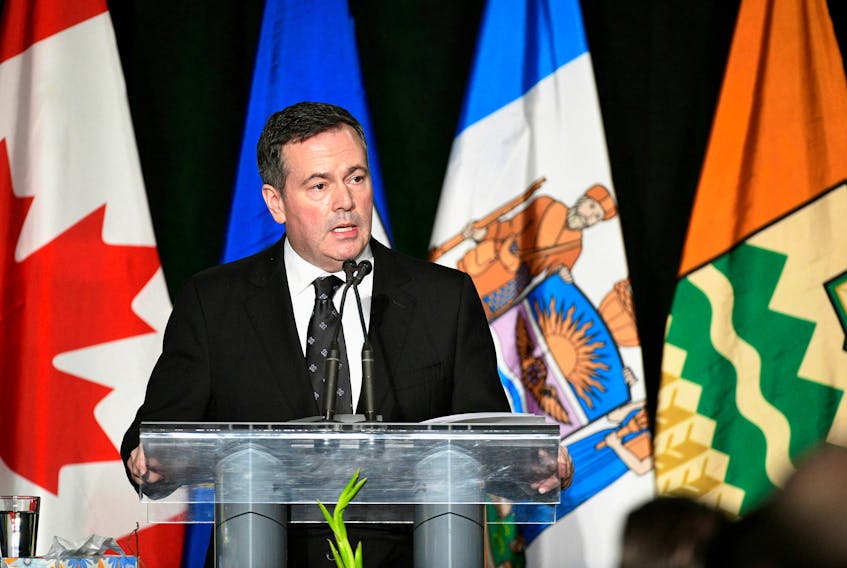KODY BLOIS
“Life isn’t black and white. It’s a million grey areas, don’t you find?” That’s a famous quote from filmmaker Ridley Scott.
The upcoming federal government decision on whether to approve the Teck Frontier project in Alberta may not be “a million grey areas,” but the decision is far from black and white.
For those for or against this project, the choice seems simple: approve it on the basis of the economic benefit it can bring to Western Canada and our country as a whole, or reject it because it is inconsistent with the transition that needs to happen to meet our Paris climate accord target.
On the surface, it is a tension between the environment and the economy, but it is far more complicated.
Teck Frontier may never be built even if approved. The suggestion that 10,000 Canadian jobs are a certainty, if the project gets a green light, is false.
The economic analysis of Teck is built on the premise that oil trades at $95 a barrel. Currently, the price is at $50 a barrel. The CEO of Teck Resources Ltd. has outlined the challenges of building the project, namely three obstacles: price (of oil), partner (a corporate partner to support the $20-billion project), and pipeline (Trans Mountain, which is currently being built).

There are numerous oil sands projects that are already approved and could begin tomorrow if the energy companies were willing to invest. While some Canadians may rejoice at the fact these projects are not being built, given the harm they might do to the environment, all Canadians should be cognizant of the important economic impact the energy sector in Western Canada has played in supporting health care and other public spending — from St. John’s to Vancouver Island.
There are many residents in my Nova Scotia riding of Kings-Hants who rely on these types of projects to support their families and pay their mortgages. And, in the last decade, the Cape Breton Island Building and Construction Trades Council had more of its members working in Alberta than on Cape Breton Island.
And yet, projects are not being built. Energy companies are looking at a 40-year window and assessing whether they can return the cost of capital in oil sands development. With a world transitioning toward renewable energy, coupled with the amount of resources required to extract oil from the oil sands, it is becoming less economically viable.
The oil and gas sector will play an important role in the Canadian economy in the days ahead, but it may not be to the same extent as in the past. What do we, as a nation, do to mitigate this reality and ensure workers, communities and our country have the resources to continue our strong standard of living? That is the key question.
The rationale behind an approval of the project is tied to three areas.
First is regulatory certainty. Teck followed the applicable regulatory process and a joint-panel recommended the project. Teck has signed benefit agreements with 14 Indigenous communities and has been consulting on this project for upwards of a decade.
What signal would a rejection send to international investors considering other industrial projects — hydrocarbon-related or otherwise?
The second rationale for approval is under the umbrella of a functioning federation. The anxiety in Western Canada is real, as a result of a downturn in the regional economy. An approval may calm tensions, but the market price for oil to drive investment in Teck is unlikely to materialize anytime soon.
Third, it will be difficult for Canada to reach its Paris climate accord targets without buy-in from Alberta and Saskatchewan. Could the approval of Teck be tied to more stringent environmental commitments from Alberta?
The reasons for rejecting the project are compelling. If built, it would be the largest oil sands project in Canadian history and would emit 4.1 megatonnes of GHG emissions annually. The project would also have a significant impact on local wetlands and species. This would make it difficult to move Canada in the direction of being a global leader in the fight against climate change.
I believe that both the decision to approve or reject Teck are not mutually exclusive to continuing the fight against climate change nor growing our economy and supporting Western Canada.
If Frontier is rejected, there needs to be a significant investment in Western Canada to support diversification of the regional economy. That becomes complicated, given that the global economy is set to slow down due to the ongoing coronavirus outbreak, and this might affect Canada’s fiscal capacity.
If approved, Canadians will expect that, in return, the federal government can point to concrete examples of Alberta’s willingness to play ball on environmental issues on a go-forward basis.
Regardless of what decision is made, the larger point is that, for reasons of climate and sustaining Canada’s prosperity, we need an investment that will mitigate the reality that Canada’s oil sands will not play the same integral role in our economy in the next 50 years that they have for the last 50. That should be a concern for all Canadians, not just Albertans.
The decision on this divisive issue will be made in the best interests of Canadians. I have full confidence that the complexities I have outlined are being considered, and so long as we have a clear plan on how to address them in the days ahead, I will support our government in whatever path it chooses.
Kody Blois is the Liberal Member of Parliament for Kings-Hants in Nova Scotia.









